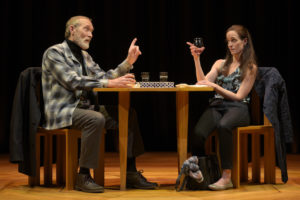Heisenberg’s principle provides a mathematical equation for the impossibility of predicting both the position and momentum of a particle precisely. It’s a concept that, with its discovery, immediately splashed over into everyday parlance. As a metaphor, what could more accurately describe life? Or, as Simon Stephen’s play asserts, love?
Heisenberg, now at A.C.T.’s Geary Theater, is the British playwright’s complex tribute to love. Complex because neither the two characters nor the audience watching them can predict either the momentum or the moment of their emotions. It’s simply too uncertain.

The play begins in London’s St. Pancras train station, when an American ex-pat named Georgie (Sarah Grace Wilson) kisses a Londoner named Alex Priest (James Carpenter) on the back of the neck. Just as the internal thoughts and motivations of Georgie and Alex are invisible, this fleeting kiss is never seen by the audience. Georgie goes on to explain that it was a mistake, that she kissed Alex because she thought he was someone else. Someone she loved who, in fact, is dead.
From that moment on, Georgie becomes impenetrable. Why does someone kiss someone else who they think is actually another – dead – someone else? Was it a momentary lapse? One of those strange glitches in memory when we forget that someone is dead because we want them to be alive so very much, or because their living presence has become so deeply ingrained in our psyche? Or is Georgie simply a nut, a woman living outside the time and space of physical reality?
Neither Alex, through Carpenter’s splendid acting, nor the audience seems able to determine which. Georgie compounds the problem by her inability to stop explaining herself. Unlike most people, she doesn’t accept her misplaced kiss as an embarrassing but inconsequential mistake, and move on from there. Instead, she insistently wants more attention from Alex, and we suspect, she wants the kiss to have consequence. She introduces herself, and then says she’s an assassin. Not really, she’s laughs, she’s a waitress. There is another possibility to her strangeness, that she’s just a card, a woman with an odd and harmless sense of humor. She says she has no control over what comes out of her mouth.
It’s two weeks later when Georgie and Alex next meet; again, it’s Georgie who is the active player. She has found him through his last name and that he mentioned he was a butcher. Googled him. An act that the 75-year-old Alex finds nearly incomprehensible. It defines their 30-years-plus age difference. She reveals that she is not a waitress and she doesn’t live in Islington, as she said when they met.
Georgie continues to assail Alex’s reluctance. She talks him into taking her to dinner. As their intimacy grows, she reveals that most of what she has told Alex was lies. And whatever she tells him, she contradicts almost immediately. The possibilities of her motivations and the intentions behind her lying, or even her inability to stop talking, grow increasingly opaque and turbulent.
He weathers her storm. He wants her, badly.
There is something engaging and physical about her perceptions of him: later she will tell him he smells like Europe. And there is something captivating about his perception of the world: he likes being a butcher because he likes the animals, he likes the way they are joined together, as if they have seams.
Wilson is burdened with a difficult role, not only because of the number of lines but because of Georgie’s character. What a challenge and a dilemma it must be to believably portray a character who is unbelievable, many intentioned and quixotic. Wilson manages it by excellent pacing, especially in those moments when she shifts from one untruth to another. Carpenter is the rock, brilliantly understated and wary: a closed door behind which emotions accumulate until everything desired must be revealed, stated and enacted.
This production is excellent, with savvy directing by Hal Brooks. The very plain sets and subtle lighting by Alexander V. Nichols enhance the movement of the play: bench, counter, table and bed rising out and sinking back into the stage floor as necessary. Not unlike the stories Georgie tells and the desires Alex reveals.
–Jaime Robles
The A.C.T. production of Heisenberg continues through April 8 at the Geary Theater. For information and tickets, visit act-sf.org.
